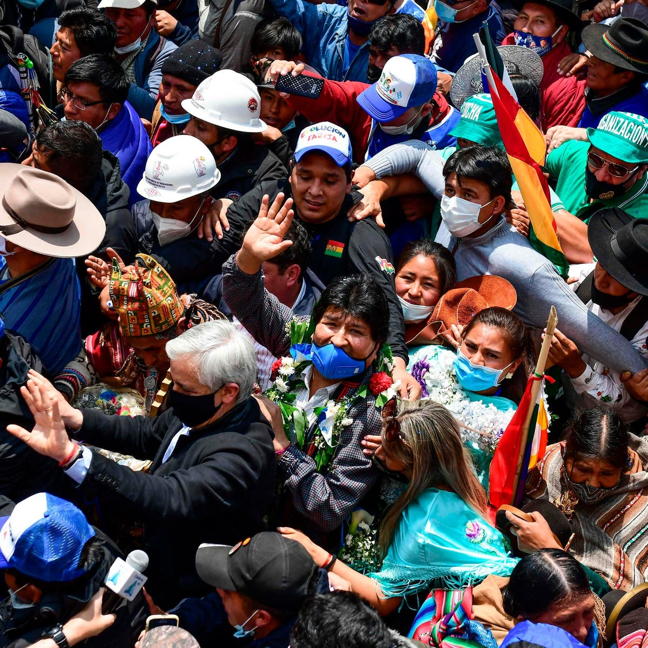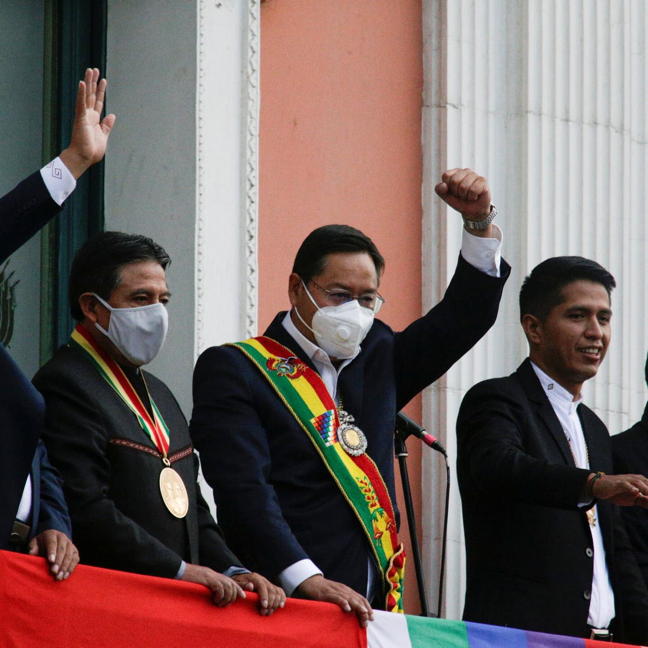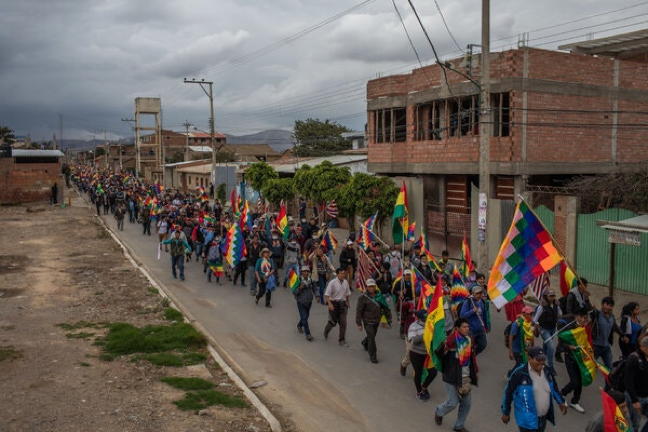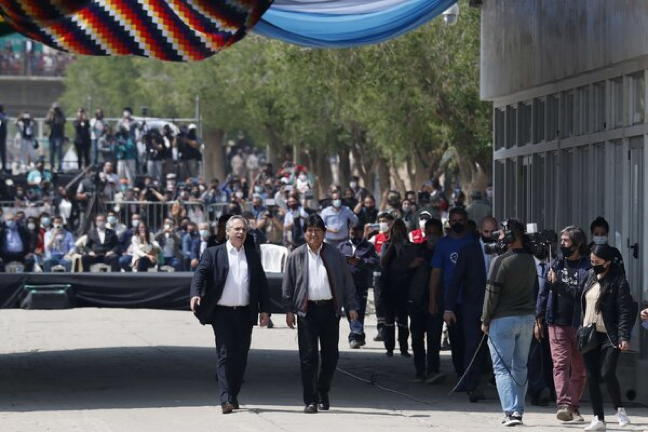
(above) Ev0 Morales, center, waves to supporters in Villazón, southern Bolivia, on Monday after crossing into the country from Argentina.Ronaldo Schemidt/Agence France-Presse — Getty Images
Evo Morales Returns to Bolivia to Cheers — and Worries
November 9, 2020 - Original article: New York Times
Supporters rushed to welcome the divisive former president back from exile, and his party is back in power. But the country’s new leaders have kept their distance.
By María Silvia Trigo and Anatoly Kurmanaev
SANTA CRUZ, Bolivia — Bolivia’s maverick former president, Evo Morales, made a triumphant return to his homeland Monday, a year after his failed attempt to keep power tore the nation apart and sent him into exile.
Mr. Morales, the country’s longest-serving leader, was greeted by brass bands and hundreds of cheering supporters as he walked across the border from Argentina on the dusty and frigid Andean plateau, accompanied by the neighboring country’s president, Alberto Fernández, and a retinue of close allies.
But beyond the jubilant reception, Mr. Morales finds a wary nation anxious to move beyond the political turmoil unleashed by his divisive bid for a fourth presidential term and focused on overcoming a crippling pandemic and economic crisis.
None of the national leaders of Mr. Morales’s socialist political party, which returned to power this month following a calm presidential election, came to greet their mentor at the border. Neither Bolivia’s new president, Luis Arce, nor the vice president, David Choquehuanca, both former ministers in Mr. Morales’s governments, mentioned him in their acceptance speeches on Sunday.
Mr. Arce had made clear during the campaign that Mr. Morales would play no part in his government, if he won — and he went on to handily beat a field of right-leaning candidates who had historically opposed Mr. Morales.
On his return to Bolivia, Mr. Morales echoed the promise, telling supporters that he would dedicate himself to labor activism, where he began his political career.
“I will share my experience in the union struggles, because the fight continues,” he said at the border crossing Monday. “As long as capitalism exists, the people’s fight will continue, I’m convinced of this.”
(below) Mr. Morales’s return to Bolivia came a day after the inauguration celebration for Bolivia’s newly elected president, Luis Acre, center.David Mercado/Reuters

But the return of a controversial leader who had tried a number of tactics to remain in power, including changing the Constitution and stacking the electoral board with supporters, provoked alarm among the government’s opponents in a nation that remains deeply divided after last year’s political unrest.
In the prosperous eastern region of Santa Cruz, protesters went on strike last week and pledged not to recognize the new pro-Morales government, saying there had been fraud but without providing evidence.
“We are worried about his arrival and we reject it,” said Marcelo Pedrazas, an opposition lawmaker, referring to Mr. Morales.
Notably, Mr. Morales remains the head of the country’s largest and most organized political party, Movement to Socialism, or MAS, giving him an important platform to potentially pressure Mr. Arce’s government, said Marcelo Silva, a political scientist at the San Andres Main University in La Paz.
“Luis Arce is trying to mark a sharp separation between his administration and his political party,” he added. “But it’s impossible to separate the actions of the leader of the ruling party from the actions of the head of government.”
Mr. Morales also remains the leader of Bolivia’s powerful coca-growing labor unions, an intensely loyal and well-organized social movement that over the past two decades has rapidly mobilized tens of thousands of members to support its leader in times of crisis.
In a symbolic move, Mr. Morales plans to travel overland from the border to the coca-growing region of Cochabamba in central Bolivia, where he began his political career and from where he fled into exile on a Mexican military plane a year ago.
(below) Supporters of Mr. Morales in Cochabamba protesting his exile in November 2019.Victor Moriyama for The New York Times

“We have suffered for 11 months, but now we’re are joyful and proud to have our leader,” Segundina Orellana, a coca-farming activist who traveled to the border to meet Mr. Morales, told local media Monday.
Few in Bolivia believe that Mr. Morales, one of the most successful Latin American politicians of his generation, and who is still adored by a large part of the country’s Indigenous majority, will stick to his stated plans of cultivating grass-roots union leaders and farming trout.
When his legal time in office drew to a close, he argued that people had demanded that he continue to lead Bolivia, and he got allied judges to rule that constitutional term limits violated his human rights.
But his decision to run for a fourth term in office in October 2019 backfired, after the vote’s validity was called into question, Bolivians poured into the streets in protest, and security forces withdrew their support.
Mr. Morales had called his resignation a military coup and took to social media from his exile in Argentina to undermine the right-wing caretaker government that replaced him.
“The Bolivian right wing, financed by North American policies, tried to stop our process of change,” Mr. Morales, dressed in a traditional Andean poncho, told ecstatic supporters in the border town of Villazón on Monday, as they chanted “Evo! Evo! Evo!” and showered him with flowers.
“We have recovered the democracy without violence,” he said.
(below) Mr. Morales, center right, crossed the Argentinian-Bolivian border with Argentina’s president, Alberto Fernandez, on Monday.Paolo Aguilar/EPA, via Shutterstock

His return, though expected, is likely to complicate the governing task of Mr. Arce, Mr. Morales’s former finance minister, who won a rerun of last year’s elections on the platform of democratic rejuvenation and moderate economic agenda. Mr. Arce received 55 percent of the vote last month, compared with 47 percent obtained by Mr. Morales last year, signaling a desire by many Bolivians to embrace his party’s project but also move beyond the polarization that characterized recent years.
Around 40 people died in the social unrest that followed Mr. Morales’s bid for a fourth term. The caretaker government that replaced him did little to heal the divisions, jailing dozens of Mr. Morales’s officials and supporters and replacing Indigenous symbols and state ceremonies with a conservative Catholic tone.
The political tensions have been exacerbated by the pandemic and the ensuing economic crisis. Bolivia has seen one of the highest coronavirus mortality rates in the world, and its economy is expected to shrink 8 percent this year, pushing tens of thousands back into poverty.
Mr. Morales return now risks undermining Mr. Arce’s efforts to bring the nation together to overcome the crisis, some analysts said.
“What citizens want now is to work, they want normalcy,” said Mr. Silva, the political scientist. “They don’t want more political turmoil.”
Maria Silvia Trigo reported from Santa Cruz, and Anatoly Kurmanaev from Caracas, Venezuela.